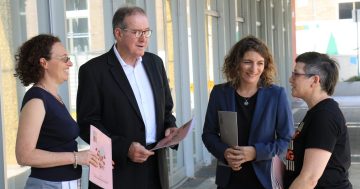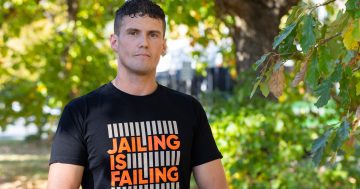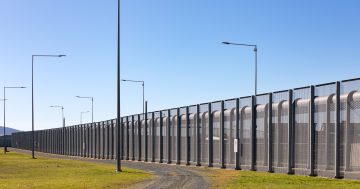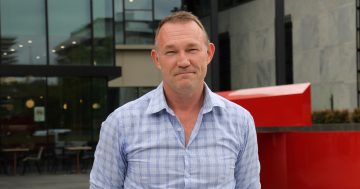
The Justice Reform Initiative members Robert Tickner, Dr Mindy Sotiri, Professor Lorana Bartels, Gary Humphries, Kate Carnell and Indra Esguerra. Photo: Lizzie Waymouth.
A new report released by the Justice Reform Initiative has highlighted the urgent need for a shift in the ACT’s criminal justice system.
The ‘State of Incarceration: Insights into Imprisonment in the ACT’ report by the multi-party alliance revealed that 77 per cent of prisoners in the ACT are repeat offenders – the highest rate of prior imprisonment in the country.
At a doorstop meeting in Civic Square on Monday (27 March), Justice Reform Initiative chair Robert Tickner and patron and former chief minister Kate Carnell spoke about the urgent need for the ACT to “break the cycle of repeat offending” by investing in community-based programs to tackle issues such as substance abuse and mental health problems.
As Mr Tickner and Ms Carnell explained, many offenders in the ACT have drug or alcohol problems, mental health issues or some other form of social disadvantage, and due to the lack of community support and rehabilitation efforts, end up reoffending.
“Judges tell me all the time that they struggle when they’ve got somebody in front of them that obviously needs help … and there’s nowhere to send them,” Ms Carnell said.
According to the report, this issue is even more pronounced for Indigenous Australians, who are 21 times more likely to end up in prison.
As Mr Tickner highlighted, intergenerational incarceration is a major issue. A recent Institute of Criminology study in NSW found that 66 per cent of Indigenous people had a parent who was previously incarcerated.
Without the support of schools and the wider community, these young people are on a “railway track to adult prison and a life of poverty and marginalisation”, he said.
This high rate of incarceration has been extremely costly.
As the report explained, the ACT’s prison system costs approximately $190,000 per prisoner per year, but given that it “fails to rehabilitate, fails to deter, and fails to keep the community safe”, the Justice Reform Initiative has called for a change in the way this investment is directed to prevent a prison system that perpetuates a cycle of reoffending.
As Ms Carnell noted, prisoners are bored and lack the training and support they need, resulting in a higher chance they “end up back in jail, at significant cost to the taxpayer”.
Mr Tickener added: “The evidence says to invest in people and programs, particularly in the community sector, and you’ll see this massive saving in the cost of running prisons.
“It’s a win, win, win outcome”.
Though there is still progress to be made, the report noted that the ACT has taken some positive steps, including the government’s Reducing Recidivism Plan, which aims to cut reoffending rates by 25 per cent by 2025.
“Broadly, the ACT is on the right policy track, but that is not enough unless you invest in necessary resources to make a difference,” Mr Tickner said, adding that the prison system is still “screaming out for reform”.
It is hoped that the report will encourage a renewed interest in criminal justice reform in the ACT and pave the way for it to become a national leader in community safety.
“We believe that the ACT can lead Australia by taking an evidence-based approach to criminal justice reform,” he said.
“This is a fixable problem and we’re really hoping that both sides of politics in the ACT can come together as they often do to send that message to the community that this is the pathway to a safer and more humane community.”
State of Incarceration: Insights into Imprisonment in the ACT can be found on the Justice Reform Initiative website.





















